Chapter 5: Education, Encouragement and Enforcement Recommendations
This chapter outlines the non-infrastructure program and policy recommendations that will play a critical role in institutionalizing a supportive environment for bicycling. Education and encouragement programs, which include outreach and events, create a more knowledgeable community that is excited to try or continue bicycling. Enforcement programs and policies help ensure legal, predictable bicyclist behavior that leads to a safer traffic environment for bicyclists, pedestrians and drivers. Existing campus programs and policies are presented below, followed by recommendations.
Existing Education and Encouragement Programs
UNC-CH offers a number of education and encouragement programs on campus that help lay a foundation for improving the bicycling environment in the future. Programs are managed and executed primarily by the DPS and by student groups.
Commuter Alternative Program
Most bicycle programming is housed in DPS’s Commuter Alternative Program (CAP). This program focuses on helping employees and commuter students decrease the number of single-occupancy automobile trips to campus. Annual benefits of the program available to bicyclists include:
- Access to twelve 1-day parking permits for permanent employees, two 1-day parking permits for students
- Access to Emergency Ride Back (shuttle service within Chapel Hill and Carrboro)
- Discounted annual fee ($10) for Zipcar, the University’s carsharing program
- Entry in drawings for prizes donated by local merchants
- Annual GoPass for fare-free transit on Triangle Transit routes for employees and students living outside the Chapel Hill Transit service area
- Discounts at local restaurants and shops
The program has also offered bicycle skills classes in the past and sponsors Bike to Work Week on campus every May. CAP staff attend various events throughout the year to distribute bike safety information, bike maps, lights, tire levers, patch kits and other useful items.
Cyclicious
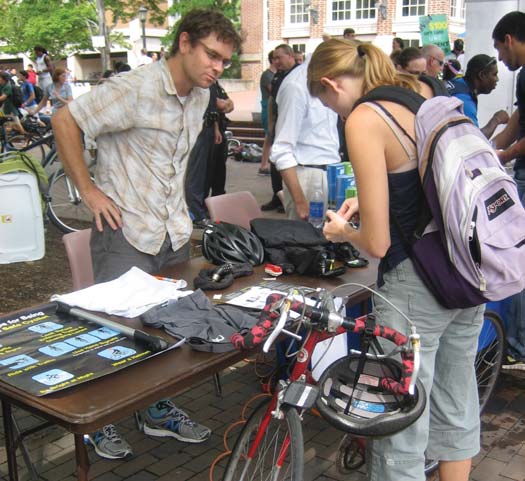
This annual event for students, staff and faculty began as an initiative by epidemiology students in partnership with UNC-CH Student Wellness, DPS, The Bicycle Chain (a local bike shop) and the ReCYCLEry (a local bike nonprofit). These partners sponsor the promotional event each year, offering free bike checks and repairs, bicycle registration and safety information.
Tar Heel Bikes
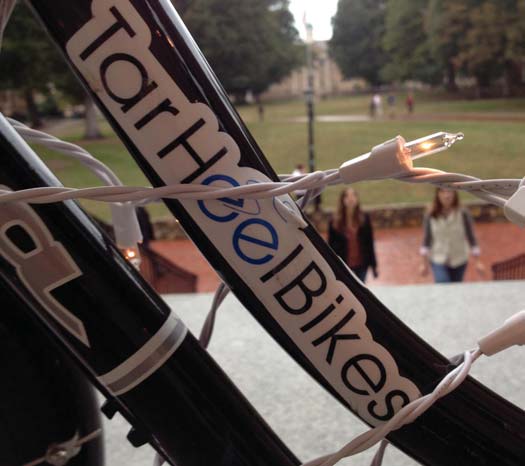
This a student-led two-year bike share pilot program launched in 2012. The funding is from multiple sources: the Residence Hall Association, New Student and Carolina Parent Programs, the ReCYCLEry NC, Housing and Residential Education, the Strowd Roses Foundation and the Renewable Energy Special Projects Committee. The program consists of a 30-bike fleet available for free rentals to approximately 3,000 residents of Craige, Ehringhaus, Hinton James and Morrison Residence Halls. Bikes are checked out from the front office of each residence hall and must be returned there before the office closes. The bikes are maintained by volunteer mechanics from The ReCYCLEry who perform repairs and bi-weekly maintenance.
At the conclusion of the pilot phase, the student organizers hope to expand the bike sharing program to more campus residences within three years. Considerations for potential expansion are detailed in Appendix G.
When asked about the bike share system on this plan’s online survey, 36.4% of undergraduates were aware of the bike share program, and 8.3% have used the bikes. Awareness of the program was lower among non-residential members of the University community who are not the target audience.
The Carolina Bicycle Coalition and Carolina Cycling
UNC-CH currently has two other bicycle student organizations, the Carolina Bicycle Coalition and Carolina Cycling. Formed in 2012, the Carolina Bicycle Coalition’s primary goal is to advocate for improved bicycle infrastructure on campus. They also promote bicycle safety and education. Founded in 1996, Carolina Cycling is a bicycle racing club that competes in all types of bicycling events and organizes training rides for students.
There are other student groups whose work relates to bicycling, though they do not provide specific programs. These groups, such as the Sierra Student Coalition, could advocate for implementing bicycle infrastructure and programs on campus.
Existing Enforcement Programs
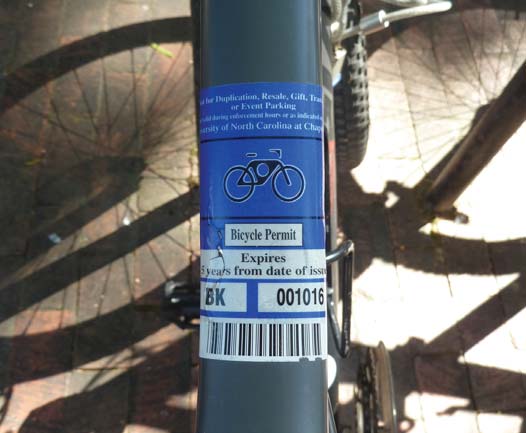
The current Traffic and Parking Ordinance incorporates all of the 2005 Bicycle Policy governing bicycle registration and parking. All employees and students are required to display a bicycle permit when bringing a bicycle to campus. Permits are available free of charge and are not transferrable between bicycles as specific information about the bicycle (model, color and serial number) is tied to the permit. Permits are valid for five years from issuance date. The ordinance states that violators of this requirement are first warned, then fined $5 on their second violation and $10 for third and subsequent violations. 1
Campus Police distribute enforcement and safety messages through social media. As available, Police also distribute safety accessories such as bicycle lights and helmets.
Education and Encouragement Recommendations
Below are recommendations for new programs to educate the community about bicycling.
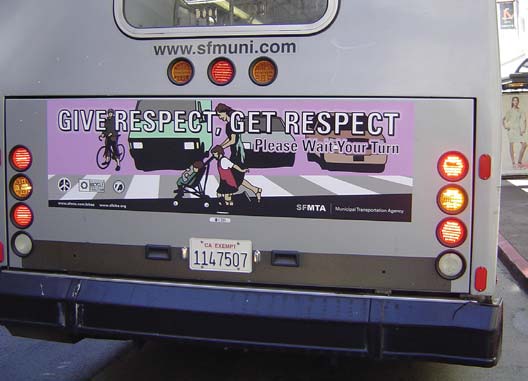
Campaigns to promote understanding and respect may help decrease conflicts amongst all modes on campus. People do not necessarily have an inherent understanding of the motivations, needs and behaviors of those traveling by other modes of transportation. For example, a driver may not understand the importance of using a turn signal to notify a bicyclist of an upcoming turn. A bicyclist may not appreciate how their travel speed impacts the comfort of pedestrians on shared pathways, and a pedestrian may not understand how important it is to make eye contact with a driver or bicyclist when crossing the street. Developing mutual respect and good communication amongst all transportation system users is central to creating a strong, multimodal transportation network.
A set of campaign materials with a recognizable graphic identity should be developed. Materials can include messaging on the campus bicycling website, light pole banners, sandwich boards and posters in dining halls and campus restaurants. The theme of respect should be integrated into other education materials as well. This program is likely best accomplished by DPS working with Housing and the existing student bicycle groups.
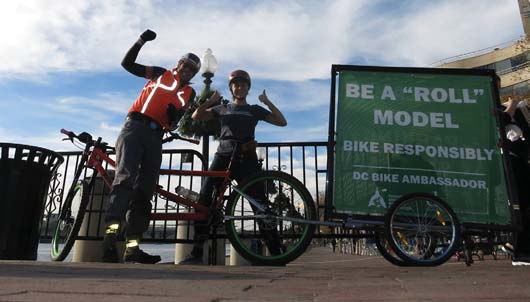
Bicycle Ambassador programs have proven successful in a number of cities throughout the United States and are also beginning to be implemented on campuses such as Virginia Tech and the University of Illinois Urbana-Champaign.2 Bicycle ambassadors perform outreach at all types of events on campus and organize stand-alone events, such as bike light giveaways when daylight savings time ends. Ambassadors are expected to act as model bicyclists by following traffic laws and riding courteously to help spread good behavior among the growing numbers of cyclists. At Virginia Tech, six ambassadors are trained about campus, local and state laws regarding bicyclist rights, responsibilities and other aspects of bicycle culture.
A student-staffed program like Virginia Tech’s could be strengthened through inclusion of faculty and staff. Faculty and staff ambassadors may be more successful than students at forming connections and encouraging bicycling amongst their peers. This program could be initiated through coordination with the Carolina Bicycle Coalition and existing off-campus bicycle groups (Carrboro Bicycle Coalition and Carolina Tarwheels bicycle club) which may have UNC-CH staff or faculty members. The program will need to be coordinated by a staff member, potentially in CAP or elsewhere in DPS.
Instructors should be trained bicycle educators. A number of League of American Bicyclist Instructors live in and near Chapel Hill and have offered to teach classes for Town residents.3 These professionals are also available to teach courses at UNC-CH. Education about the rules of the road, what to expect when riding in traffic, safe bicycle operations and emergency maneuvers will help bicyclists ride and interact safely with other modes. In order to tailor the national curriculum to the UNC-CH context, additional messaging about respectfully sharing pathways could be added to the classes.
The University may also explore adding a cycling skills class to the Lifetime Fitness curriculum where an indoor cycling course already exists.
Discounted or free bike safety accessories such as lights, locks and helmets may encourage UNC-CH community members to take part in these classes. Yale University has seen an increase in cycling skills class enrollment since beginning to refund membership fees in the campus bike share program for participants.
3 League of American Bicyclists instructors teach a “Smart Cycling” curriculum that consists of classroom and on-bike instruction. Information about the program is available.
Graduate students should also receive bicycle safety materials and messages during their orientations. Student groups can help DPS, Housing and Campus Health with both of these efforts.
- Summary of Chapel Hill laws regarding bicycling, including sidewalk riding prohibitions
- Summary of North Carolina laws regarding bicycling 4
- How-to’s for various bicycle facilities: bike lane, sharrow, pathways and shared roads
- Safety tips for traffic interactions at intersections and highways on/off-ramps 5
- Campus policies regarding safe bicycle operations and traffic laws
- Safety equipment recommendations (helmet, lights and reflective/bright clothing) and list of local sources
- Bike locking best practices
How We Roll at OSU
The Ohio State University partnered with a local bicycle nonprofit to create a bicycle safety campaign in 2011. Because the campus area was identified as one of the state’s high-crash zones, the state departments of transportation and public safety funded the program. Mass media, grassroots outreach and educational bike tours formed the foundation of the campaign. Tours were led by trained peer educators (students and recent graduates) who used the 12-mile rides through Columbus’ neighborhoods to conduct on-bike, in-traffic education about safe cycling skills. Campaign outcomes were positive: Tour participants reported a statistically significant increase in their levels of confidence, and over 700 bikes were outfitted with new lights. 6
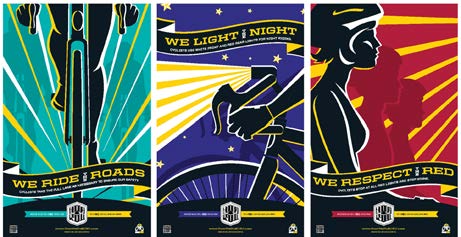
4 The NCDOT maintains a publication on state bicycle laws which may be summarized for a UNC-Chapel Hill guide.
5 The League of American Bicyclists’ Smart Cycling Tips are a good starting point for this resource.
6 A full report on the program is available.
Staff in the Facilities Planning Department should be aware of bicycling as a form of transportation that will be considered, as are pedestrians and automobiles, in all master planning and capital projects. They should also be familiar with the Campus Master Plan, which includes the Bicycle Master Plan. The University Architect, the Facilities Planning landscape architect and senior management in particular should receive regular training on general bicycle planning and practices. This will enable them to act as an information source within the Facilities Planning Department and to effectively liaise with DPS, campus bicycling advocacy groups, and the Town of Chapel Hill on bicycle planning and design projects.
Educational opportunities for both DPS and Facilities Planning can be local, regional or national and incorporated as a part of the licensing required by these professions. Staff should also be encouraged to attend campus and local bicycling educational events.
One potential option that has been implemented at Georgia Tech University is to educate the campus population at the time of parking permit purchase. Each buyer must click through a series of educational slides which are followed by a short quiz about rules of the road and safety related to all road users. This quiz reaches a broad population of drivers, but the approach may need to be modified for implementation in UNC-CH’s current parking permit purchase system.
- Maps: campus, Chapel Hill, Carrboro and region
- Bike Registration: online application
- Safety: bicycle class schedule, and links to safety videos
- Security: locking how-to and best lock to use
- Bikes-on-Buses: tips for using bike racks on buses
- Resources: Student groups like Tar Heel Bikes, Carolina Bicycle Coalition, and Carolina Cycling; local advocacy groups; advisory boards; email listservs
- Bike Plan: upcoming programs, policies and infrastructure around UNC-CH
7 These pages are at https://bike.uci.edu/ and https://to.yale.edu/bike
- On-road bicycle facilities
- Recommended off-road through routes
- All campus stairways
- Bike rack locations and type: basic, covered and secure
- Bike tire pump locations
- Shower locations
The map should be available in a printable format and linked to the DPS bicycle website. This map should be updated on a regular basis as new bicycle facilities are added on campus and throughout Chapel Hill and Carrboro.
The annual fall bike ride should be held in coordination with Cyclicious, which is already held in the fall and is also designed to build excitement about bicycling.
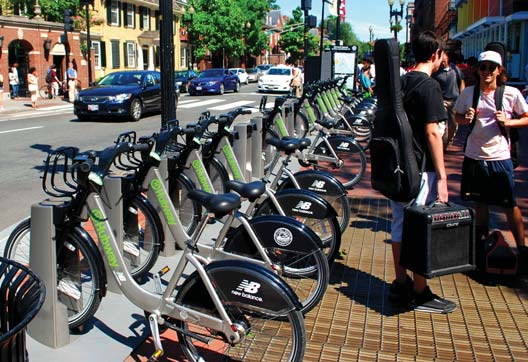
The feasibility of a bike share system that covers both the University campus and the Town should be jointly studied by the Town and UNC-CH. Conducting a feasibility study and exploring possible business models and partnerships will lay important groundwork for a future bike share system. These systems are increasingly popular on campuses throughout the United States and are a way to visibly demonstrate University support for bicycling. In its first year of a two-year pilot, Tar Heel Bikes, a student-led program, had 4,700 rides taken on its fleet of the 30 bikes available to resident undergraduate students living on South Campus. As noted earlier, organizers hope to expand this program throughout campus and into Town.
Raleigh is currently undertaking a feasibility study of bike share. Though it is unlikely that campus affiliates would ride a bike share bicycle from Chapel Hill to Raleigh, the two systems could potentially be run by the same operator and integrated such that members can use systems in both jurisdictions. Conversations about a regional approach to bike share should be included in any feasibility study. A full explanation of considerations for bike share on campus and in Town is available in Appendix G.
Enforcement Recommendations
8 Full Colorado State University policies
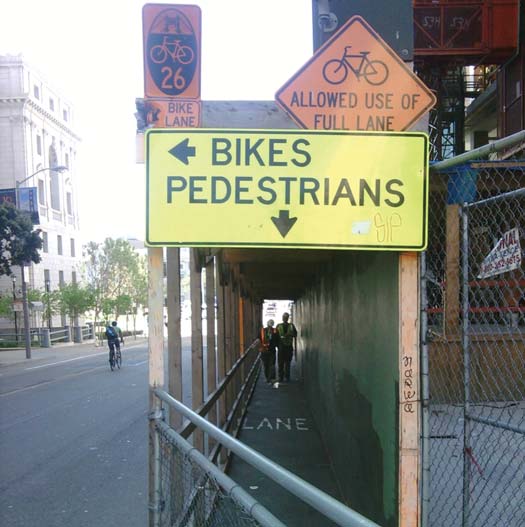
As building and road construction projects occur on campus, it is important to ensure that bicyclists have safe passage during periods of construction. It is recommended that all construction plans be reviewed by the transportation planner to ensure that bicyclists (and pedestrians) are safely accommodated if a facility will be blocked by construction equipment or barricades. For example, if construction results in a blocked bike lane or a narrowed roadway, an interim solution can consist of shared roadway warning signage and temporary shared lane markings.
